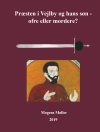In ‘The Ethnology of Europe, ‘ R. G. Latham meticulously explores the complex tapestry of European cultures through a rigorous ethnographic lens. The book is characterized by Latham’s exceptional clarity of thought and meticulous attention to detail, employing a descriptive style that deftly combines narrative and analysis. He delves into the historical, linguistic, and cultural dimensions of various European populations, presenting a systematic categorization of ethnic groups and examining their origins, migrations, and social structures. This work sits at the intersection of anthropology and history, drawing from the burgeoning debates of 19th-century European ethnology and reflecting the period’s growing interest in scientific exploration of human societies. R. G. Latham, a prominent philologist, and ethnologist, was deeply influenced by the intellectual currents of his time, particularly the emphasis on empirical research in the study of peoples. His comprehensive background in languages and an extensive academic career at institutions like University College London equipped him with a unique perspective that informs his ethnographic studies. Latham’s commitment to the scientific method and his critical approach to source material were instrumental in shaping a work that sought to establish a foundation for the study of European ethnology. ‘The Ethnology of Europe’ is an essential read for anyone interested in understanding the diverse cultural landscapes that constitute the continent. Latham’s insights resonate well beyond the confines of his time, offering a profound understanding of Europe’s ethnological past that remains pertinent today. This work is not only crucial for students of anthropology and history but also for readers who aspire to appreciate the rich tapestry of human variety and the implications of cultural identity in contemporary society.
Sobre o autor
Robert Gordon Latham (24 March 1812 – 9 March 1888) was a British physician, ethnologist, and philologist. Born in Billingborough, Lincolnshire, England, he graduated in medicine from the University of London in 1832 and later pursued a career in philology. His contributions to the study of languages led him to become a professor at King’s College London and later a Fellow of the Royal College of Physicians. In the sphere of ethnology, Latham’s work focused on the races and languages of the British Isles but also extended to broader European contexts. His scholarly volume, ‘The Ethnology of Europe’ (1852), stands as a testament to his exhaustive research in the field, attempting to catalogue and differentiate the various ethnic groups and linguistic divisions on the continent, an endeavor illustrative of the nineteenth-century interest in the origins and relationships among European peoples. Latham held unconventional views on race and was a strong proponent of polygenism, which influenced his ethnological interpretations. Latham’s interests in philology saw him author several other significant texts, including ‘The Natural History of the Varieties of Man’ (1850) and ‘Descriptive Ethnology’ (1859). His literary style is marked by a meticulous attention to linguistic detail and a tendency to classify and arrange based on language and etymology, reflecting the intellectual trends of his time. Despite criticisms about some of his theories and classifications, Latham remains a notable figure in the early development of ethnology and philology.












